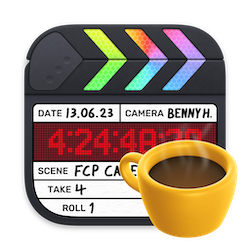#
SCHOCK
The Violent Footage Tornado (alternate title: “Final Cut is simply years ahead!”)
An Interview with the director and the editor of SCHOCK (Germany, 2023)
This Zoom interview was transcribed with Transcriber, and translated from German via DeepL.
It covers not only the technical workflow of the film regarding the Final Cut eco-system, but also touches on its unusual creative decisions, how filmmaking as a collective joint questions hierarchical structures, and if the director as VFX-artist could be a good idea.

#
Biographies
Daniel Rakete Siegel grew up in Cologne, Germany. Started his directing career after studying at ifs and KHM with the series "Im Knast", where he also met Denis Moschitto (co-director and leading actor of SCHOCK). You can follow him on Instagram and Twitter.
David Wieching started film editing via an apprenticeship as media designer and was head editor at btf for 5 years, responsible among others for "Neo Magazin", later "ZDF Magazin Royal" (famous German late-night show). You can follow him on Twitter.
Daniel and David know each other from joint projects in the early days of their working careers and even have been roommates for 5 years. Their debut feature SCHOCK just screened at the Munich Film Festival 2023.
#
Synopsis
Bruno has lost his license to practice medicine and is now practicing illegally, no questions asked. His ambition is triggered when a lawyer makes him an offer to treat a leukemia-stricken mafioso. But this not only puts him between the fronts of rivaling groups, but pushes him further away from his old life. A dangerous game between two worlds begins.
The narration is characterized by sparse dialogues and a varied visual language. SCHOCK succeeds in simultaneously affirming the "gangster film" and reinterpreting it through bitter realism, avoiding typical traps of the genre, like coolness or quirky comic relief.
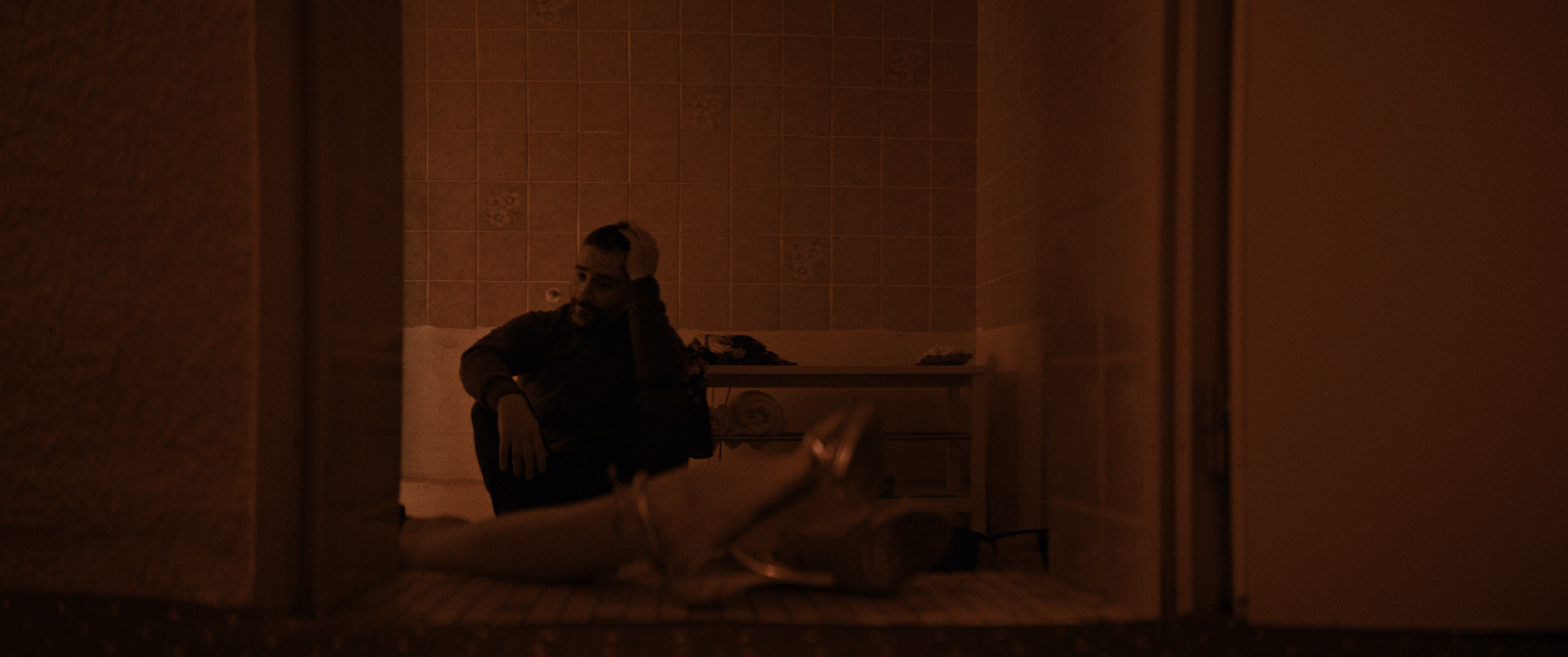
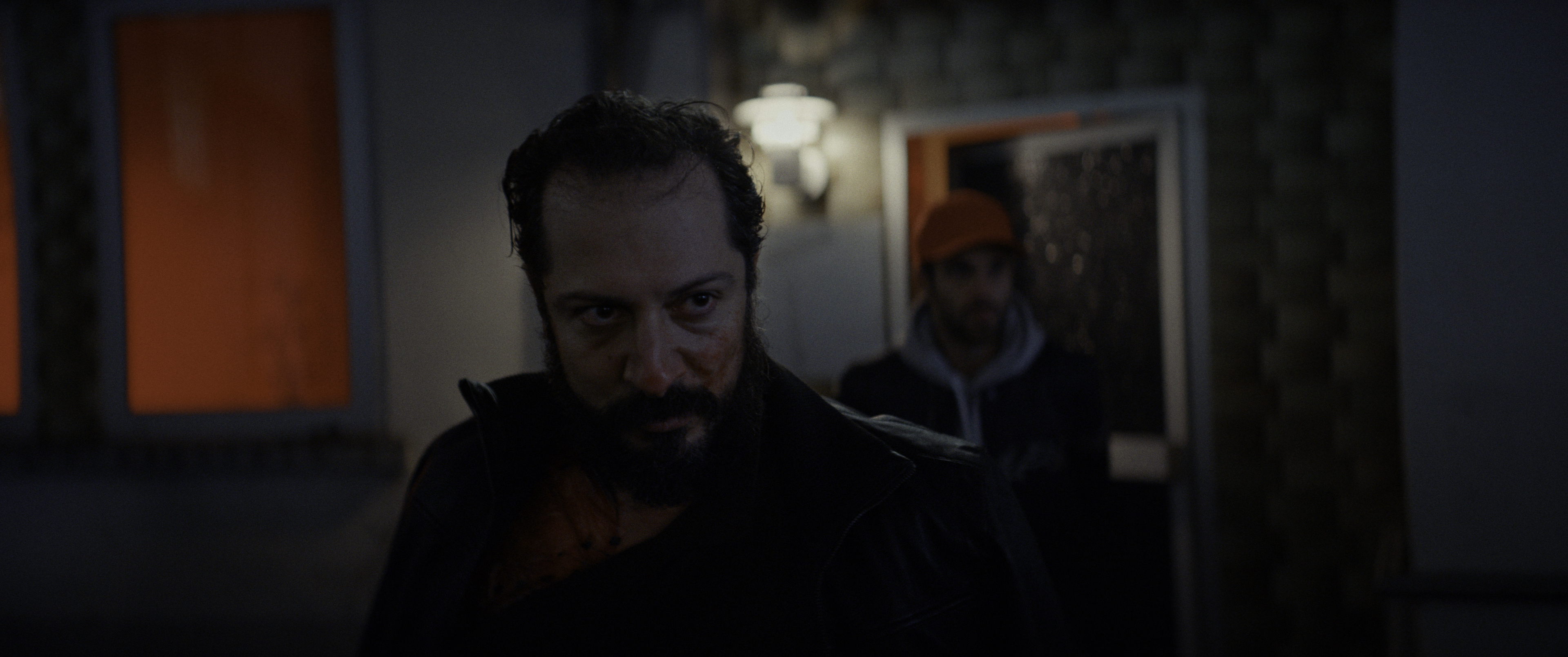
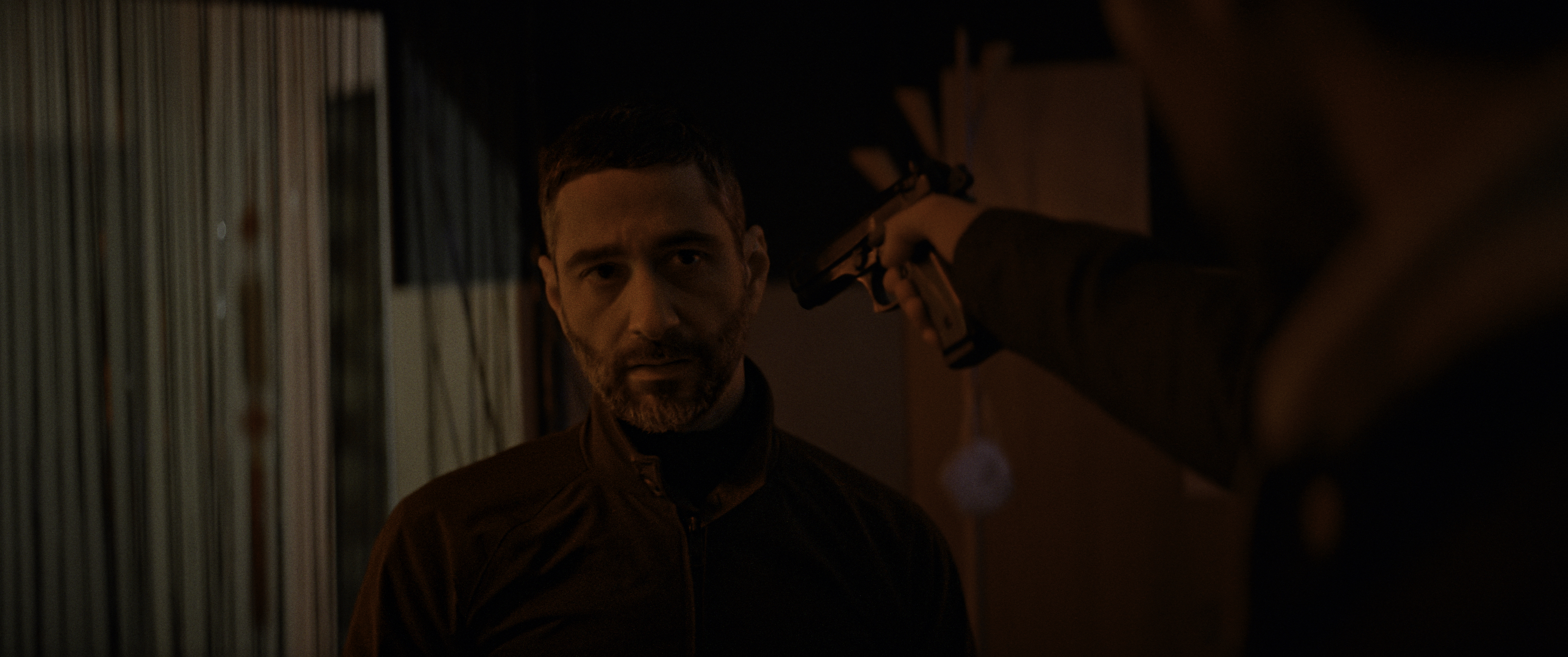
#
Introduction
FLORIAN: Nice to meet you, Daniel.
DANIEL: Hi.
FLORIAN: I was lucky to attend the premiere of SCHOCK. Great movie!
DANIEL: Yeah, cool. That was really cool. We always say that we worked on it for eight years. That's true. But of course it wasn't eight years full throttle. It was from the first idea to the final thing. And the last three or four years were really intense. That's such a long time. It was much more intense than we would have thought. And I actually did the grading until the last second.
FLORIAN: Hey David.
DAVID: Hi Flo.
FLORIAN: I'm glad to have you guys on here. FCP Cafe is still very young and I thought it would be nice to try out an interview.
DANIEL: Final Cut is important for both of us. To bring the thing forward is of course super cool. Especially in the professional realm there aren't that many resources online, honestly.
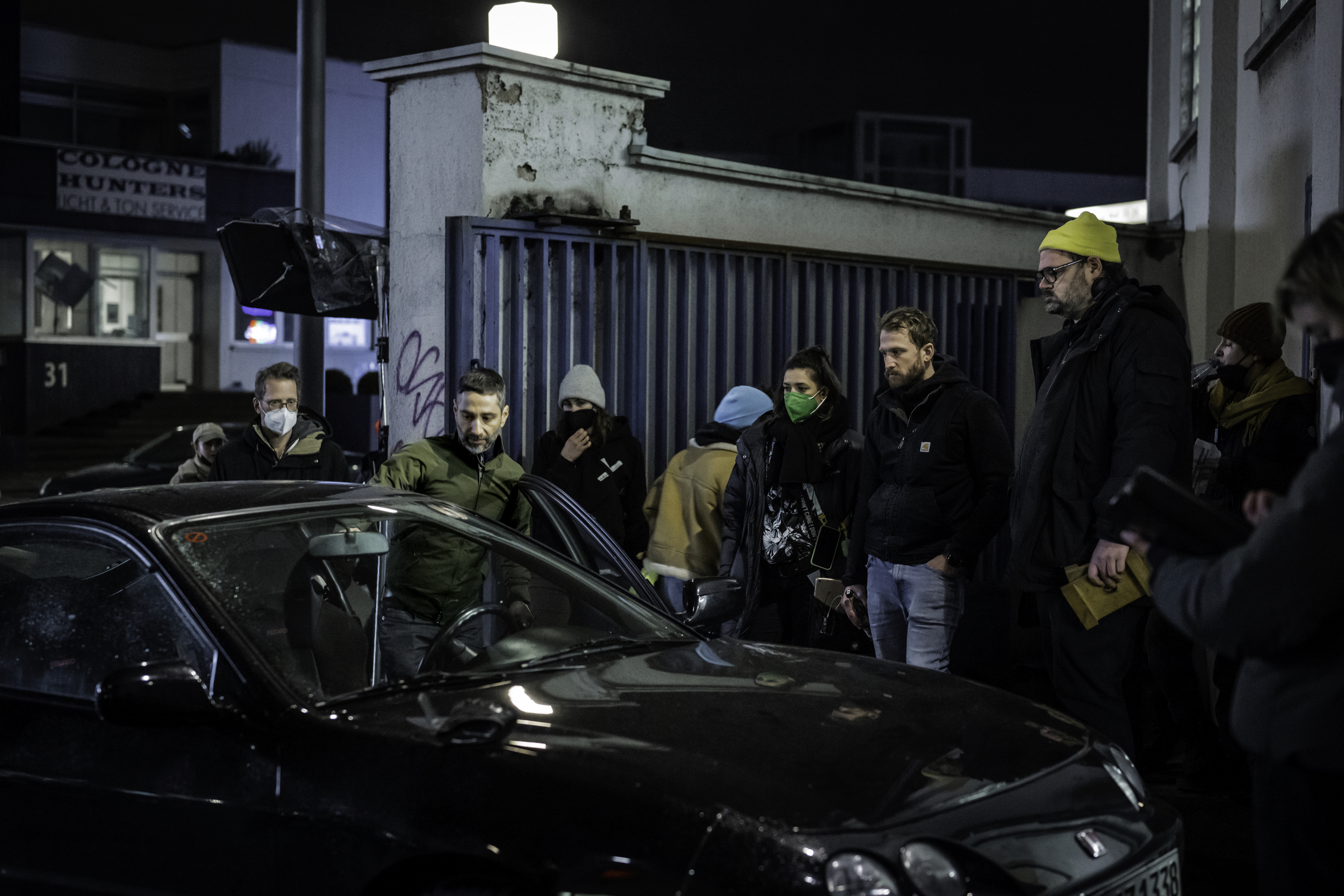
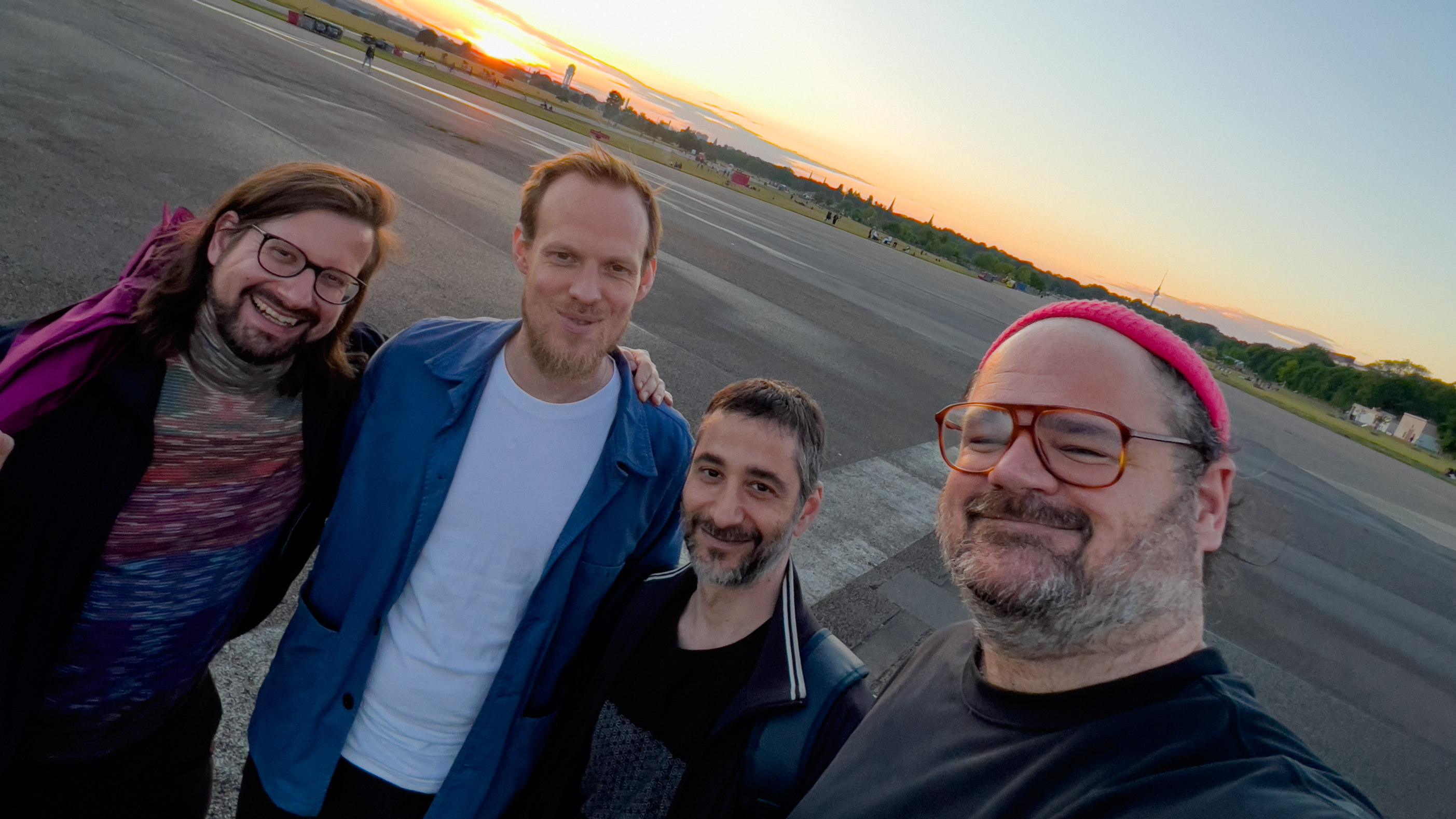
#
Collaborative Cinema
Do it yourself and do it together
FLORIAN: Before I get to the technical stuff, I thought we'd talk a bit about SCHOCK. As David told me, the whole thing emerged from a circle of friends. And at the same time it's the cinema debut for many of the team. How did the beginnings of the script come about?
DANIEL: Well, I've known David much longer than Denis (Denis Moschitto, co-director and main cast). We shot the series "Im Knast" in 2015/16 and became close friends after the first season. I was ready to make my film debut. Denis wanted to work as a full-blown filmmaker and not "only" as an actor. And we figured we want to do this with David, not only as the guy who cuts everything together in the end. So we formed a gang of three - also as proof of concept of how we want to work. It wasn't like, "Oh, we want to tell this practitioner's story." It was more about: how do we actually want to shoot (and produce a film) at all? We took a much more radical approach. The film had an internal working title. We called it: "Let's fuck shit up!". So, this freedom was really important to us from the get-go, not for reasons of protectionism, but to not be held back by some kind of structural corset. For example, we didn’t want to work closely with a post-house, rather we wanted to be in control of it ourselves; we wanted to do the exports without calling a technician or anxiously send out VFX lists only to have someone tell us it’s too expensive. We wanted to do it on our terms and with our particular skill-set. And that was at least as important as the story: to figure out our own process, like a personal framework for filmmaking. Is it possible to do it that way? And if so, then we'll cultivate that in the future.
FLORIAN: So you imagined an even more intense collaborative process as filmmaking already is? And you started with the key-positions of editing, acting and directing?
DANIEL: Yes, you could say that. You also have to say that Denis didn't want to play the lead role at first. He wanted to do the part behind the camera. But that ultimately changed during Covid19, I have to be honest.
DAVID: The pandemic changed the script as well.
DANIEL: Yeah, exactly, that opened a door.
DAVID: It inspired parts of the story that weren't there before. Probably the strongest storylines now.
FLORIAN: So I understand it like this: everyone brings their particular skills from a different direction and then you mingle together. And Denis brought his skills from the acting-side?
“ Some even say the Film Editor is like a second director. Denis recently called it shadow-directing. ”
DANIEL: Yes, basically that's right. And if I may say one more thing, which is really close to my heart; a really underestimated part of your (David and Florian’s) work is: Editing isn’t only connecting lines and securing continuity! If you do a somewhat decent job, you finish writing the script in the edit! And I think it's totally important not just to award credits, but, prospectively, understand it as the collective effort it already is. Some even say the Film Editor is like a second director. Denis recently called it shadow-directing. It's sometimes very difficult to distinguish: what is script, what is acting, what is camera, what is staging? And with editing, somehow nobody sees it unless it sucks. Or you win an Oscar, like in this Queen film, because you clearly saw how strong the interventions are there. Unfortunately, there's no real obvious traction for this, neither inside nor outside our line of work, that articulates how much these processes are interdependent and extremely interdisciplinary. And I also think that a lot of the work of directing on set is about opening up spaces for people to do their work well. That's always been a saying that we've had: you don't tell actors how to play it well, but you find people, through casting and all other processes, who work it out with you. And for us, Editing is simply part of that from the very beginning. That's the way it is for me from now on. With every larger project, it's simply an absolute must-have that the editing is there as early as it can be. That you simply talk about everything. So David was even present during prep for blocking the scenes. That all paid off. That's not the most efficient way of working as far as human life is concerned. Nevertheless, for me it’s the nucleus of an ideal shooting situation. To manage this in 30 shooting days, which have come to destroy you. (smiles) To pull that off, that’s killer!
FLORIAN: David, did you actually co-write or just read the script and comment on it?
DAVID: The latter. I’ve never had the script open in Final Draft in this case, but I had read everything since the first treatment draft and we talked about it afterwards. What works well, where do I have ideas for development? It was such a gritty learning process. I would also say that my initial comments were more like, "yeah, it's all totally awesome, looks awesome, great, exactly." The closer the shoot, the more complex the exchange became. And I think that in follow-up projects we’re already noticing how this collaboration has changed and intensified.
FLORIAN: So, you're actually benefiting from this intense work during writing and pre-production. Are you actually getting faster? More precise?
DAVID: Several things. We knew the story and the characters so well that there were few questions left. We developed a lot, of course we'll get to that in a minute when we talk about principal shooting. But I think it's more that through this experience the degree to which I get involved in new projects is now much more intense. By how we've learned to communicate with each other about film, what we like, what works well, what direction we want to go. And also that we can imagine writing a script together. I mean, I would still have to prove that I can do that. But in the process of this film, we came so far that I don't think it would be an absurdity for all of us if that happens.
#
Workflow
Editing a feature film with Final Cut Pro
FLORIAN: Okay, do you mind telling us briefly what the technical workflow was like, from the set to the editing room. And after that, we would look a little bit at how you actually worked dramaturgically on set. How were the proxies delivered to you and how were they created?
DAVID: As I said, we wanted to do as much as possible ourselves. But of course, in order to have a certain security, just for insurance and stuff like that, there was still a post-production house involved. And that was WeFadeToGrey. The proxies were created there, then the proxies went to Victor (Rosario, Assistant Editor), and he synced everything. Then I took a walk to Victor's place, because it was very close, and picked up the footage on a hard drive, super oldschool, and if he was already done, also the Final Cut Library, or he sent it to me later.
FLORIAN: So it’s been ProRes proxies?
DAVID: Exactly, yeah.
FLORIAN: And have there been notes from the ScriptSupervisor?
DAVID: Yes, from Stella Fachinger. I was also on the set for the first two days of shooting, and then we talked on the phone, and in the classic way there were Lockit files digital ScriptSuper-notes that Victor transferred into FCP).
FLORIAN: And then there was one event per scene? Or did you do it via keywords?
DAVID: No, I had one event per shooting day and then sorted the scenes by keywords.
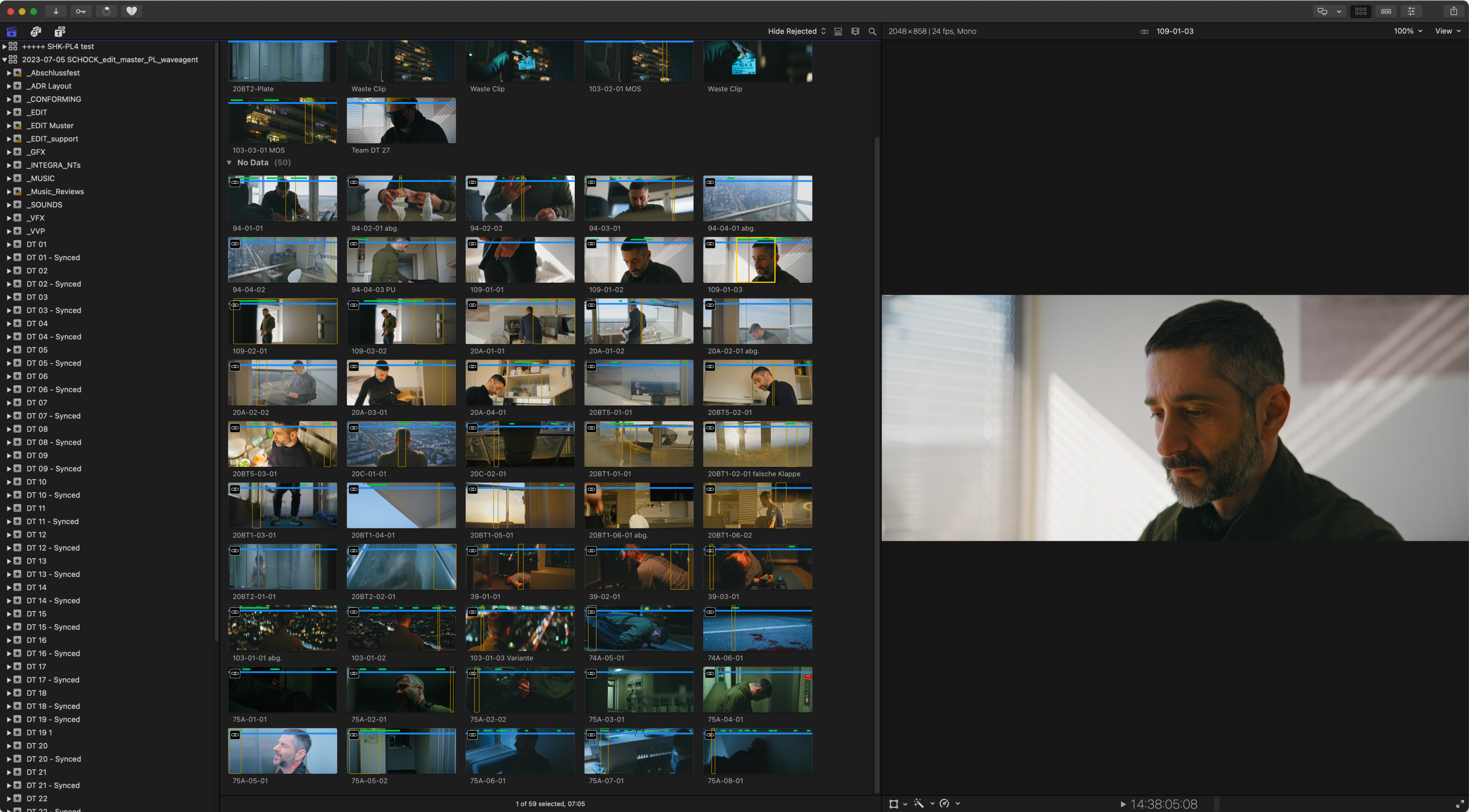
FLORIAN: Okay. Then you split it into reels yourself at some point, or scene-Events?
DAVID: Nah, actually it always stayed that way. And I didn't split the timeline into reels either, I just started and kind of kept going and when Final Cut slowed down I just reduced the library (deleted older timelines) and then everything rolled again smoothly. That way I didn't have the need to structure it differently. Admittedly, our workflow was really very low-tech in that respect. And, what we haven't said yet is that I hadn't worked on Final Cut once before.
DANIEL: You did, once.
FLORIAN: What do you mean not once?
DAVID: Well, once, I did once....
FLORIAN: Wait, this is where it gets interesting.
DAVID: Well, I once assisted a friend (Frido Körner) on a commercial, with the approach "I want to learn a little Final Cut". I did rough cuts there, too, and mainly got the assistant stuff down, to understand how Final Cut works in the structure. Then I looked at your (Florian, German editor’s association internal) introduction again, in preparation for the film and then just jumped in at the deep end and started. Because Daniel knows Final Cut so well, I had no worries for the time after the shooting. And during shooting I could always call Frido if I had any questions...
FLORIAN: Wait a minute, Daniel, but you've done a lot before, smaller projects?
DANIEL: Yeah, exactly, so since that (FCPX 2012) came out, I've cut everything I could with it. Obviously I haven't edited a feature film, but I've gained a lot of experience in terms of workflow stuff. And I've done a lot with it. And I loved it very quickly. The first version was really bad... but after they changed the library structure, it worked. Also, for David and me, a very important point was that we both had no desire to work on Avid and also had our experiences with Premiere. With Final Cut, you can just dig in and just work sensibly - cut "from the gut". And that's what I personally really wanted to do, because I know: You wipe over the footage, make a range, throw everything you find interesting in the timeline - snip, snap, snip - drag scenes to the left, to the right, to the left, to the right and then you're done....
FLORIAN: Okay. And David, did it feel for you like that right away? All this throwing in and freestyle mixing clips, as Daniel describes the whole thing?
DAVID: Totally. Although our workflow and also the structure of the library was not ideal. But the pure editing, that went super fast, well off the cuff. Basically, I've never understood it if you only want to work with one technique or one software. Because first of all you’d limit yourself. And I think they all have their advantages and disadvantages. Final Cut is simply years ahead! But still, both Avid and Premiere have their justification. At btf, we worked on Premiere for all those years and it was perfect for one-shots that had a lot of graphics and VFX shots. It would have been unthinkable to work on Avid. And that was kind of the approach to learn the "new hot shit" as well. Of course, that started with the viewing and selecting, how much fun that is! Because otherwise, in Premiere or in Avid, with every new project, I'm actually always faced with such a conundrum first, that I have to decide how I want to watch and select now.
FLORIAN: Okay, let's start there. You get the first shooting day in for SCHOCK, and then: how do you select?
“ My motivation to work like this also came from my buddy Frido, who always used to select in Final Cut with the Playstation controller. He used to sit on the couch, in front of his client monitor, he does a lot of advertising and has a really fat client monitor, so he used to sit on the client couch and did selects with the controller. ”
DAVID: Unlike with Avid or Premiere, I don't have to decide: do I just watch everything first? Do I do markers or a select sequence or do I start cutting directly and slowly work my way through the footage? When I'm working on Avid or Premiere, I usually do it in such a way that I start cutting right away and then go from the footage further into the structure, into the deep. With the way you can mark favorites in Final Cut, I've gone back to doing selects classically without feeling like it's costing me too much time, energy, and motivation. I feel like selecting with other NLEs, maybe that's fun, too. But when you're done you haven't done anything yet. (Laughter) You don't have that feeling with Final Cut. So: I marked my favorites, and then in the next step, in the View I already hid everything (note: show only Favorites in Browser) and with that I had my select reel in the Browser as a starting point. My motivation to work like this also came from my buddy Frido, who always used to select in Final Cut with the Playstation controller. He used to sit on the couch, in front of his client monitor, he does a lot of advertising and has a really fat client monitor, so he used to sit on the client couch and did selects with the controller.
FLORIAN: He put the shortcuts on the controller?
DAVID: And marked In/Out, favorite with the Playstation controller.
FLORIAN: Play, Pause, In/Out, Favorite, that's all you need.
DAVID: And Forward, Backward.
FLORIAN: Yes.
DANIEL: And Reject, maybe, too.
DAVID: And Reject still, yeah. And so then I watched and selected. Started editing in parallel as well, but it's a much more fluid and cohesive process.
FLORIAN: And with this Favorites-concept you went through the whole film? So it's not like you did extra keywords again? That would be my method: the favorites all get one keyword, then the favorites get suspended and I select favorites of that keyword (fine selection).
DAVID: I also created keywords for a few dialogs. But I discarded that relatively quickly, because there's just not that much talking in our film. (Laughter)
FLORIAN: Yeah, exactly. We haven't even mentioned that yet. I'll add that later in the short summary.
#
Watching Dailies
Shooting day briefing “New School”
FLORIAN: And then let's say now, you're done with the shooting day and then came the special thing, which maybe was still common in the past, that you did something similar to watching dailies with the head-of’s. Now that went a bit differently with you guys. That's of course totally interesting, how this process was at the end of the shooting day between the two of you. Or three of you, together with Denis?
DAVID: Exactly, and sometimes even four, with DoP Paul Pieck together. We already met with the motivation, relatively classical, to watch dailies. Then, when you're sitting in a café where it's a little bit louder, that's not such a good idea anymore. And relatively quickly we moved on to not discussing the previous day's dailies, but rather doing a kind of style critique. On the one hand, how the camera works and how we want to narrate cinematically with the camera, and on the other hand about the character development.
DANIEL: We did make some drastic decisions, it has to be said. For example, we changed the character who gets shot at the end in the showdown. That was originally a different person. And that evolved exactly from those conversations. David was telling Paul all the time, "Dude, fuck the axis, go in, shoot sloppy, it doesn't matter, let go!" And that totally triggered a lot. You really can't underestimate that. It was incredibly important. Yesterday, in a moment of madness, I looked at the version we shot - not one stone was left unturned, except for very important details. The film changed incredibly during principal filming. And that was totally cool, I would say. To always discuss with each other and to hold each other up. It was a constant comparison: here we are on the right track, there we have to put in more, there we give less. It's also a film that intentionally leaves out information in a lot of places, in a way that hopefully doesn't bother you. Without those conversations, we never would have been able to do it that way.
DAVID: Frustration management, too. The shoot was tough as nails. There were really few shooting days for what we had planned. And of course the guys were used up quickly. And I gave a lot of motivational speeches. Not because it didn't work. It was often about saying: we're on a good path!
DANIEL: Yes. With David, at the end of the day, it was another view from the outside. While I was already essentially the first viewer via the small monitor on set, David was the next first viewer.
FLORIAN: Yeah, logical. I can also feed back to you that, my impression after the premiere. Because I knew that David was there, I also tried to notice the editing and the mise-en-scene. In other words, I tried to watch actively, what I usually avoid at the first screening. And it's striking: the film is extremely varied! Longer camera movements, pans, montage-sequences, but also more classic blocking and also somewhat fancy camera angles. And still, the thing seems to be made of one piece. It just doesn't fall apart, but it makes the whole thing lively and exciting. And maybe that's also due to this process.
DANIEL: For sure.
DAVID: We didn't just talk about the footage, but also about the next day and what’s planned. And that's where we sometimes developed together, we said "come on, this scene: one shot!", or "come on: two safety, but no shot-reverse-shot!", just brave: something interlaced, or maybe a bit architectural... And these are then ultimately also the scenes where the shots could last very long (without a cut).
#
Redefining the Genre
Without negating the legacy
FLORIAN: The film manages to stay tough and serious. How hard was it for you not to drift into satire or coolness? And that maybe ties into what you guys were just talking about.
DANIEL: So it's a mixture of very easy and very, very, very difficult. When we decided to make a movie at that time, the idea came up, "what about a gangster movie?". And then we actually said, "no, this coolness, somehow we're not up for it at all". And that was, I think, a narrative demand that had been seething with us for so long that we couldn't get past it. We wanted to play with it. For example, Fahri (Yardim, supporting cast) is wearing a cool leather jacket and is looking grim, but in such a way that it doesn't tip over into a comic reality. That was actually a very simple decision. A film that nevertheless serves the genre, with a showdown, with a certain form of depiction of violence. That it has to be a bit borderline. Not a film that has to please everyone. It was ultimately about going a little bit to the extreme. For example: How little can you talk without thinking it’s a student film where the task was: you're not allowed to talk. So, getting the coolness out of it wasn't that hard. But a film that builds a coherent atmosphere and world within these 114 minutes, without classically learned mechanics, without a love interest, with a main character for whom you can't clearly say why he's actually acting like this. That was very, very difficult. And it took a lot of time.
“ How little can you talk without thinking it’s a student film where the task was: you're not allowed to talk. ”
FLORIAN: Cool gangster movies - there would be a lot of references. So there are pitfalls when you're staging it the opposite way and dealing with actors who are used to it differently. There's a lot for you to do on set, isn't there? Always holding them back a little bit or nudging it in a different direction.
DANIEL: Yeah, ..., we still have a few ADR parts in it that are a thorn in our side. That's why I watched the raw footage of a scene again. And I was totally surprised. It's the scene where Bruno is at Giuli's house for the first time and treats this wound. The scene is just forever long. The footage is forever. And Denis is acting with this medicine bag that was completely filled, like, 300 times in the movie. Incredibly hard to act shit. It's an awkward prop. Incredible number of times he has to open it, close it.
DAVID: Gloves always on, mask too.
DANIEL: The handling, the continuity - that wasn't the difficulty. It was the ability to remain calm. Not to go for efficiency in storytelling. Not to tell it like: now he's sitting with his sister, then he has to say "sis" three more times so that people understand.
DAVID: For the scene, we had a relatively steep idea for the character constellation in the days before (during the dailies-discussions). There's not much of that left in the result, but it led to quite a lot of nuances.
DANIEL: There used to be a different ending, it has to be said.
FLORIAN: They're hugging, aren't they?
DAVID: Exactly.
DANIEL: Actually, something else happened after the hug.
DAVID: Right. And also in between, some other stuff happened where the relationship between brother and sister gets a different conflict that we ended up leaving out, but it totally helped the buildup of the scene. Because a conflict arose between the three of them. That was then left out. But it still remained as a basic conflict in the constellation of the characters. And this development was totally exciting for us. A bit like a director's trick, but without being shitty to people, so that they reach their limits. Like throwing in an idea to push everyone to the brink. Coming back to the genre arc, what was really important for the shoot as well: to actually show a lot of things and to be explicit. Not to cut away in moments where it's about violence, or even the consequences of violence, or everything that's medical in the film. We wanted to be in these moments and absolutely show it. For example the treatment of the gunshot wound. How he pulls the thing off and you see the "pizza" (inflammation around the wound) and the hole. We have been so lucky with our make-up artists, Daniel Schröder and Annette Schirmer. It had to look good. He takes off the patch and you think "oh shit, this fucking hole in the back". Starting from there to the thumb at the end (of the film), we wanted to show everything. Not to cut away in those moments and only tell it with sound because it's easier. Sound also works, because it hurts associatively. But we wanted to show it all, as statements of intent to the genre.
DANIEL: Immanence, that was a total buzzword for us when we were shooting. We tried to hold it up everywhere we could. For the genre. To somehow get pressure into it. Meaning: real shots, real locations, no car rides in LED hell. And above all, to let actors play and not only shoot for the edit.
#
Creative Struggles & Frustration Management
FLORIAN: Yeah, cool. Let's go into your fine editing phase then. David, you had Denis and Daniel sitting there all the time - or did you send them out of the studio sometimes?
DAVID: We had a rough cut of, I think, 2:45 hours. The first days were a bit wild … aftermath of the wrapping party. And then we really just sat together every day. So I don't remember any situation where we discussed something, now they're going to leave, we'll talk more tomorrow and I’ll execute.
DANIEL: We thought that was going to happen, but it didn't.
DAVID: Exactly, we thought it was going to happen. Sometimes I like that, too, as a certain protection mechanism. If I don't happen to know the director or producer that well yet, then maybe I’d like to have time alone to try something out and not have someone sitting behind me. With Daniel and Denis, there were no such insecurities or fears, for sure. But of course, when you're three guys... How many weeks did you shoot, Daniel?
DANIEL: I think 30 days in total. I remembered 18 weeks of editing.
DAVID: 18 weeks of editing, but that was including principal shooting. We were together the whole time. And just fought our way through. It was an incredibly intense process. But at the same time, you have to say, we had no single night shift. Not on any day.
DANIEL: That was surprising. That was really surprising.
DAVID: That was very surprising. Because Daniel and I are geared to spend the whole night. Maybe we were there until 10 p.m., but then the last two hours were mostly talking.
FLORIAN: You haven’t been so limited in time. For a TV movie you have to be done after 10 weeks.
DAVID: 18 weeks was all right. We always said to ourselves, if it takes longer: screw it. We had an extremely low budget and we made super little money on the film. But because it was all of our big screen debut, we didn't give a shit.
FLORIAN: Daniel, can I just ask, with your Final Cut background, were there moments where you said, “let me do it myself”? Did you also sometimes, maybe for the better, push the keyboard over to each other?
DANIEL: Yes, it could be that I did that once. It wasn’t the usual "there's a director sitting around". We always sat behind David, jerking around like dudes, which had to be annoying sometimes, right?
DAVID: Vaping noises, behind me all day.
_“ Final Cut invites you to go on forever: fade here, something there, jab jab, while it is running (!), ... ”
DANIEL: Vape, vape, vape ... I picked up the mouse every once in a while. I really like seeing the timeline to get a feel for what's happening. And what I find so nice about Final Cut is that you can just let it run, trim another clip while it's running, turn the music down a bit, you can just march through. Even Denis felt the vibe that you can just march and “massage” the footage as you like. We actually took moments now and then to get away from the computer and watch it on a TV-Set. Because Final Cut invites you to go on forever: fade here, something there, jab jab, while it is running (!), and so constantly the attention is gone. But I don't think I'm a better editor than David, on the contrary. I'm just a bit more into technical shit, whereas David is more into "I'll edit the scene nice and tidy". If there's a new Voice Isolation thing in there, I immediately want to know how it works. Where the limits of it are and where they aren't. David just doesn't give a shit. So I was doing more of an editing assist, if you will.
FLORIAN: The filmstrip view and how visually Final Cut presents everything, even to a bystander, is helpful to your work.
DANIEL: Totally. It's totally crucial. I've also suffered a lot in Premiere and Avid. More in Premiere, even less in Avid. I really think: getting access to the footage, so you just have a visual reference of what you're working on, that's easy in Final Cut - I can’t understand why you wouldn't want that in editing. I really don’t fathom.
FLORIAN: We agree on that. Were there certain challenges in this fine-cutting phase, where you struggled and fought or where it just took longer and you were able to solve them?
DAVID: For example, we cut out the death of the character Naimee, the prostitute, very early. And built it so that that strand basically ends loosely for Bruno. After she’s got the sepsis and then an allergic reaction, it just got better again and he doesn't hear anything of her anymore. Particularly Denis and I favored that for a very long time. In the end, it's always a bit theoretical. You kind of have an idea to tell it differently and think: that's okay, it didn’t have as much impact as we thought it might anyways. Naturally, that's the easy way to get rid of it. And that's where Daniel really pissed us off, in a positive sense. He "beat us up" to not leave it like that and to give up. And I also think my ethos developed a lot during that time. As an editor, you probably don't want to admit that, but of course sometimes the path of least resistance is a grateful one.
FLORIAN: My experience is almost the other way around, that I always say, "I know you don't like it, but I'll remind you in two days, that maybe we should cut it out." Here the director is fighting obtrusively for something? But I guess it makes sense in your collective construct?
DAVID: Yes, and I think with me it derives from "learned stress" from other projects. I had to unlearn that, in a way. We're editing together again at the moment. Daniel can say "yes, let's have another look", as often as he likes - I'm rarely annoyed. Except maybe when I'm tired, the dog is barking and I'm hungry and I think to myself, "now leave me alone!" The three of us have had a lot of things to deal with, I guess. Even Denis, who has never sat in the edit so intensely. I mean, with three people, if there's a disagreement, then it's two against one. There's no other way. And of course you’ll get annoyed sometimes. But in the end we all mastered these challenges, even if it took a little while. Denis is also happy now that Naimee's death is still in there. And I also like the way we approached the scene in the edit and with elliptical storytelling. How Bruno sits there and is desperate about what happened. That's how it became a strong scene. Not an action sequence of "will he manage to save her?". He arrives, she's already dead, and through our editing his desperation becomes very clear and relatable.
FLORIAN: Bitter reality.
DAVID: Exactly, and there again, this whole process is totally awesome that we wrestled for this scene so much and it changed for the better.
DANIEL: Exactly, the letting go, even of frustrations from the set. We had that with two or three other scenes that took a little bit in the edit to get done. At some point, one of us said, "Nah, come on, let's do it. We'll take out the montage-sequence and we'll go through it properly, again." I mean, you know for yourself when you're sitting in the edit and suddenly the knot unravels. And you know you’ll just need three frames here, a different setting there, and maybe a little bit of a different mindset ... We also had a small, very early test screening with Rainer Nigrelli and Flo Böttger. Watching it with different eyes has also totally changed a lot for us. And for David it was just stress, because there are two guys sitting behind him and say, "Get in early." - "No, out earlier." - "Boom, there's music." - "Nah, without music.". That was really super untechnical. That's why, I think, we haven’t had real conflict, except for general frustration management. But there was a long phase, also during editing, where we had no idea whether the film would work. I think we were really afraid that we would cut it and then it would just completely suck.
FLORIAN: Yeah, that’s in every process, usually after three weeks of fine editing or so. I would now slowly shift towards post and then wrap the whole thing. Maybe a little question about Final Cut: Did you miss something essential in the whole process? Or where you guys said, "Gee, that feature would actually be good."
DANIEL: I got two, three things. David?
DAVID: Nah, I don't think so. I think during that time there was an update with Dupe Detection. That was great. Because that was totally missing. Then all of a sudden it was there. And it was like "Thank you!".
FLORIAN: And the Voice Isolation came with the same update, I think.
DAVID: Right, and I'm not very interested in that.
FLORIAN: I think it’s great.
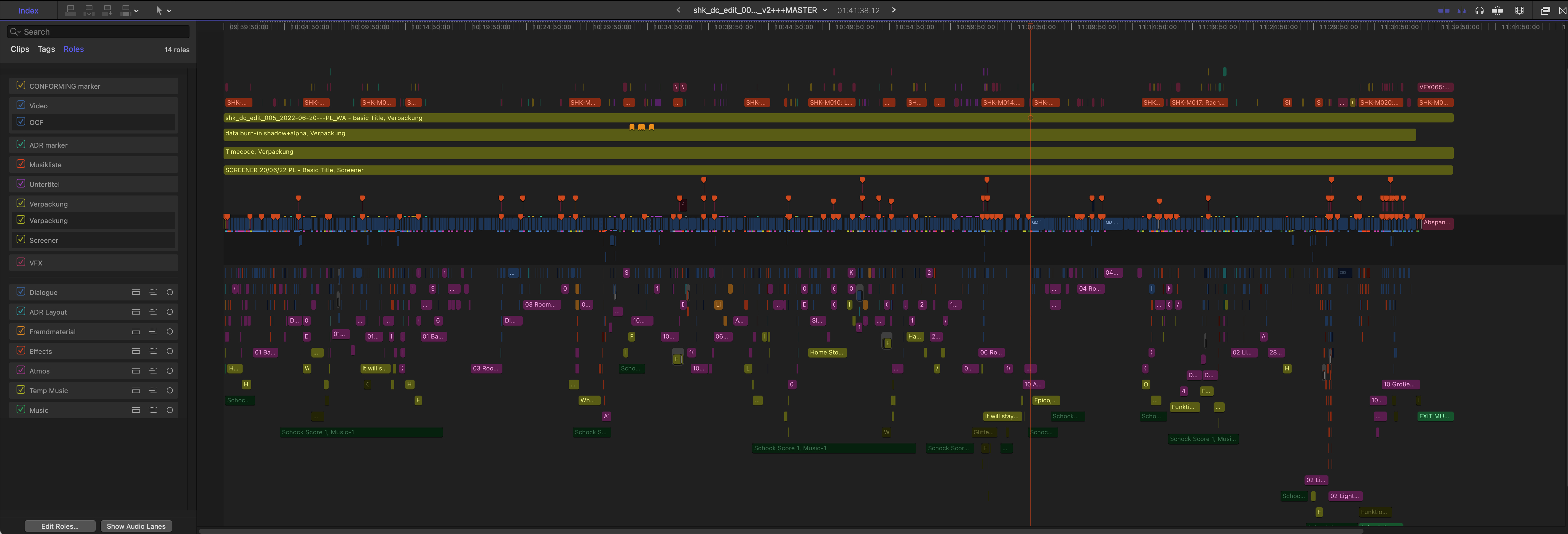
#
Post Production
Delivering with Final Cut Pro
DANIEL: Yeah, it's awesome. I think during the edit itself - no complaints. Since I also did VFX, I took over the project technically after editing. And there are a few things during the handovers. For example, I would like to be able to lock the cut. That you can kind of say, Primary Storyline: no more timing change. That would be nice, for example. And sometimes it's a bit annoying that metadata in the Event and Timeline don't stay in sync. For example, if you create a Role for a VFX-source, that is not reflected in the Event, e. g. as a keyword-range. The information is only in the timeline. We had VFX shots marked with their own Roles to get them out as sources for VFX. I just did the math again. 71 fullblown VFX shots, but in reality it was more like 90. And that's not counting stabilizations. Because I did it all myself it was quite a lot of stuff. Then, of course, like I think a lot of people, we also had problems with stabilization, one should just be able to rebuild them 1-1 on other workstations, I think. And timecode... Or is that solved now? There is this timecode window. Is it possible to display the different tracks? I still don't think so.
FLORIAN: Well, you can display it, but you can't burn it in.
DANIEL: Exactly. That's also really annoying, for example, that you can't do proper burn-ins. That would be really nice for a professional workflow, when you send it out to sound-post. So I brought the stuff into Resolve and made burn-ins there, then brought it back into Final Cut. It always takes time.
FLORIAN: Well, there are workarounds inside FCP for these problems, but it could be better. And what was the point with stabilizing? So it wasn't the same on one computer as it was on the other?
DANIEL: No, that worked. But at some point it was like, you do a stabilization and everything is good. If you open it up on another computer, the analyzing never stops (note.: is constantly re-rendering). And the still frame is different from the moving picture. Feels a little wonky, I'd say.
FLORIAN: It would actually need some kind of render lock for one clip. That's what Alex4D once suggested.
“ I also think that you can't design sound as beautifully in almost any other tool as you can in Final Cut. It's an incredibly cool sound tool! ”
DANIEL: Exactly. At least some kind of rebuild function for the internal effects, which are otherwise great. And of course a render lock would be great as well. I think those are the few things I can think of right now. I also think audio lanes are great. I'm very happy about that. I also think that you can't design sound as beautifully in almost any other tool as you can in Final Cut. It's an incredibly cool sound tool! And that's super important to all of us. We worked on sound a lot and very precisely. So it's a shame - but this is a ProTools issue - when you put so much work into details that then all goes down the drain in transfers. I think that's really sad. If I still had time to learn programming somehow, I would do everything I could to get the sound in the studio to be exactly the same as it is in the edit. And also this "In Avid, a lot of people only edit with mix-tracks"-paradigm, that you don't really care about the sound in the edit, that bothers me.
FLORIAN: So, when you think about the deliveries now, David, you just handed it over to Daniel? And although you onlined it at WeFadeToGrey you still did the VFX and even the grading?
DANIEL: Exactly.
FLORIAN: But in Resolve probably.
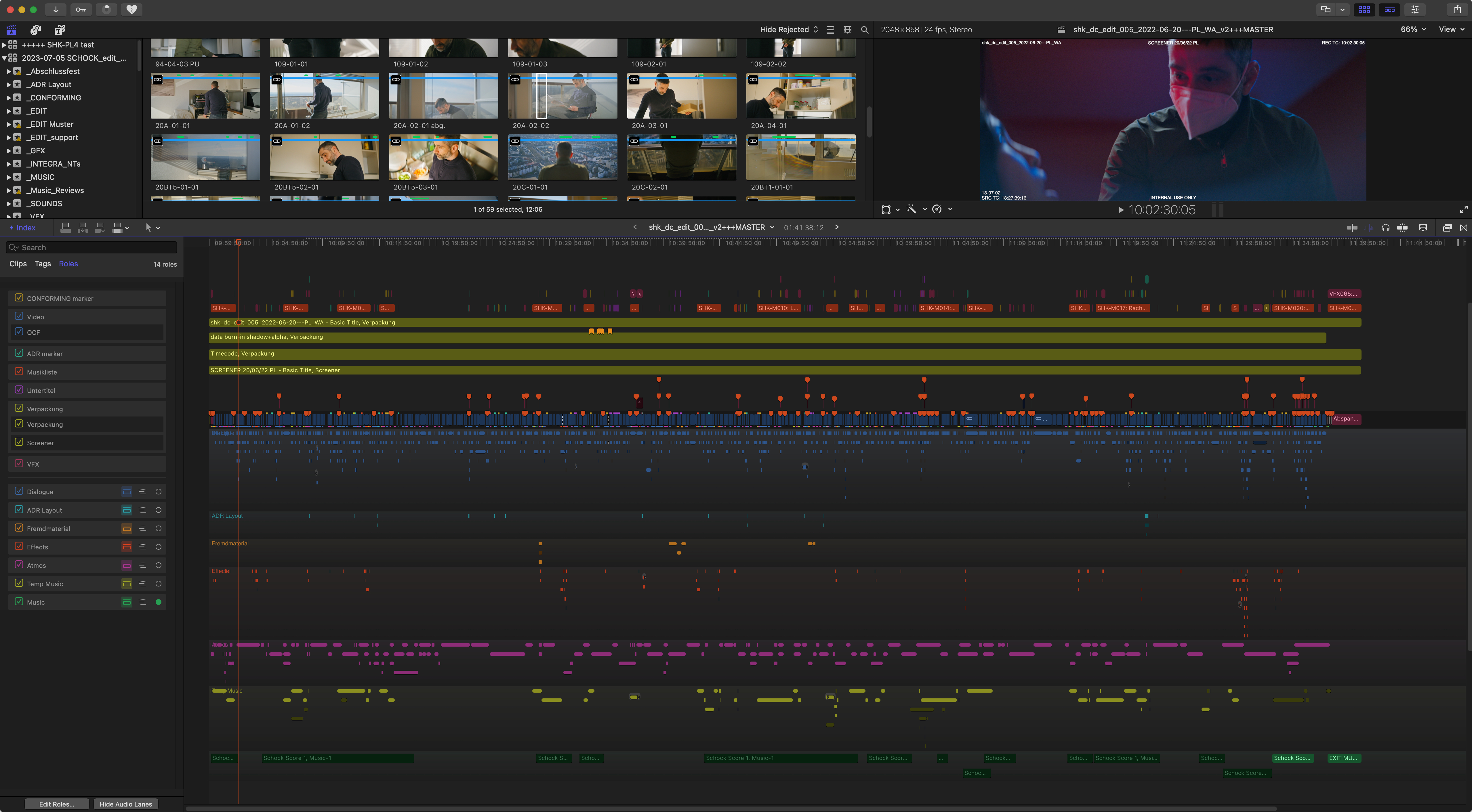
#
pre-grading@home-office
DANIEL: Exactly. The film got proper grading after all. And of course, that's only possible because I did a relatively intensive pre-grading. I built myself a nice little grading box in the office with black styros. With my Mac Studio and a 4K-DCI Eizo monitor, which I calibrated to 709. Then in Resolve I worked in full resolution in DaVinci wide gamut/intermediate, which is the RCM-2 color space, a color managed workflow. So I prepared grading on my 709 monitor and cut in all the VFX, then I could just switch to P3D65 to prepare it for the grading cinema. So that process worked extremely well if you ask me.
FLORIAN: Kind of like ACES, right?
DANIEL: So when ACES came out, I was always working in ACES. And when RCM-2 was released from Blackmagic, and the new HDR grading tools ... that is, I think, from the usability so fine, so nice to work with, I find ACES in comparison a bit ... sharper, feels more brutal somehow. I think (as a director) it makes much more sense to colorize your own film than to edit it. You can quickly change things radically. And develop a taste and build and try things out. Long story short, it's been a bit low-tech of course that I did it here in my office but then we moved to WeFadeToGrey and had the total opposite there in the grading cinema. That's kind of where the magic is for me. And what we haven't even said yet: We shot with the Sony Venice on full frame Cooke lenses, all 3:2 open gate in RAW (X-OC-XT), so 2:1 anamorphic 6K. Which is a quasi-12K image (de-stretched) or 12096x4032. But the finish was in 4K. WeFadeToGrey helped us a lot, especially Swen Linde supported us very well. We can only be very grateful. I don't think you could have done much more deluxe in Cologne. They were major supporters of us.
DAVID: Exactly, even though we wanted to do a lot ourselves, they really helped us out a lot.
FLORIAN: And this high resolution, of course it helps with VFX, as well as in editing, when you want to zoom a little further into the frame. I assume that you also used that more often.
DAVID: Yes.
DANIEL: Yes
#
Director = VFX-artist?
FLORIAN: Okay. I think now we should, but I'm still interested in the VFX workflow, briefly. So did you do those in Resolve or did you send them back to Final Cut?
DANIEL: Well, I did the onlining in Resolve. You have to know, during film school, I already had gathered experience in title design, grading and VFX-stuff for family and friends. My secret, technical post-production life, so to say. (smiles) So I did the VFX partly in After Effects, partly in Fusion. We don't have any 3D composites in it. But I always sent everything back into Final Cut easily via fcpxml, so that we could make clean playouts and sound transfers "offline" with the 2K proxies. We also re-delivered if anything was needed, or looked for another take. The Final Cut project was still in use during that process.
FLORIAN: Okay, okay, okay.
DAVID: Maybe a mini remark about the VFX. We just really had an endless number of retouches.
FLORIAN: Removals, retouches, split screens.
DAVID: Split screens and also really complex split screens, sometimes with two or three other retouching layers.
FLORIAN: Especially because of the handheld camera every single plate has to be tracked before comping, probably a bit tricky.
DAVID: Exactly, and therefore mostly zoomed in a bit. So it's not an uncomplex thing that Daniel did there. Which was just cool, briefly back to the editing process, because we were just never in the situation of having to think about whether it can be paid. We just did what we wanted to do in the end. Denis and I rather tried to hold Daniel back and say, hey, can't we not kill this VFX-shot, because you know what else you have to do.
FLORIAN: Daniel, how long did it take?
DANIEL: Yeah, a long time. I think three, four weeks at least. It was really crazy. But it was also cool. It was glamorous. Almost all the tracking stuff I did with Mocha because I did a lot of rotoscoping stuff with it as well and I just really like using Mocha. Also the performance with these 6K, de-stretched, was relatively good. I mean, I don't even want to pretend it had good performance when it comes to that kind of footage. It was overwhelming. A violent footage tornado that ran through my equipment. I worked with Mocha Pro. It was super awesome, I have to say. But then I had some problems with Mocha. There's a relatively new surface tracker in the Pro version that you can use to track organic stuff. It always crashed. And then I wrote back and forth with Boris FX support several times a day for a week, I think. It was a very intensive exchange. And that was really cool, how they took care of it. I thought that was totally great.
FLORIAN: Because it was so fresh on the M1, probably.
#
Working with Independent Developers
DANIEL: I think they were a bit keen on it, but they also saw, I think, that I do comparatively complex tracking stuff that you have to get to grips with somehow. But I was totally accepted by them. They sent me an alpha version early on so that I could work here. And that was just totally awesome, I thought. It was like a little nerd convention, over email and a little bit of chat, just solving problems with each other. So, you know, the nice thing was that I didn't really have a deadline. It wasn't like, fuck, now I've lost three days with some technical problem and I have to hustle through it so that I can keep to my timing. And I had a short contact with the X2Pro people, Marquis Broadcast. They also helped a lot to identify the problem in the first place. For example, we were talking about 32-bit audio. I think they've got a handle on all that in the meantime. (edit: yes. Fixed in 4.5.16) And that was just great that someone could make a reasonable statement. That you don't somehow only look for the error in yourself and don't understand why there is only noise in ProTools.
FLORIAN: Yes, that was my experience as well. Especially in the Final Cut world with all the third-party developers. Intelligent Assistant or CommandPost for example.
DANIEL: I worked with that as well. Yeah, that was great. So I did all the VFX lists with Producers Best Friend. Absolutely awesome. Even with thumbnails! If I had done that by hand, I would have been on it for a week.
FLORIAN: Yeah, insane. And they're all very accessible. If you're lucky, you can solve your problem within two days with two emails. I’d say, shall we officially call it a day?
DAVID: We'll keep talking at you for another two hours. (Laughter)
“ Technically, I found that going through this process with Final Cut was incredibly convenient. Even the re-delivery process was very relaxed. If you document it thoughtfully! And if there's one tool that invites you to do that, it's Final Cut. ”
DANIEL: I have one last thing. And I'll make this real quick. What was so cool for us was when our producers and everybody said we're going to go back into the mix and we're going to re-cut. That everyone worked together like that. With EDLX, I pushed out EDLs for reconforming and created changelists with "Change List X". With reference audio because we cut with stems and only brought in original audio where there were changes. I provided the Soundpost with a small flood of deliveries and that worked super well. So don't be afraid to change things afterwards. It's not like we changed every other frame now, it was much more selective. We added one more scene, took one out, changed a few timings and tried to relax so that we didn't have to go into the whole process again. In the process, two or three VFX shots were created and I did the conforming in Resolve, I bounced the transfers back to our audio post, which worked really well. And I have to say, a little bit of “new school filmmaking” is that you don't let technical shit like that stop you. That just because you have a Picture-Lock planned, you're not going to change anything anymore. It's important, of course, that you do it reasonably and don't, like a maniac, say, “I'm not going to stop editing the film”. Technically, I found that going through this process with Final Cut was incredibly convenient. Even the re-delivery process was very relaxed. If you document it thoughtfully! And if there's one tool that invites you to do that, it's Final Cut. You get lists beaten out of there, technical solutions via Resolve and other tools... you can do things that are otherwise very difficult.
FLORIAN: That's good to hear. So I'll say, David, Daniel, thank you so much for talking to us. I wish you big success for SCHOCK. That's going to start in January 2024?
DANIEL: Probably. It's not quite set yet, but that's what we're assuming right now.
DAVID: That's the plan, January, February.
FLORIAN: Fingers crossed.
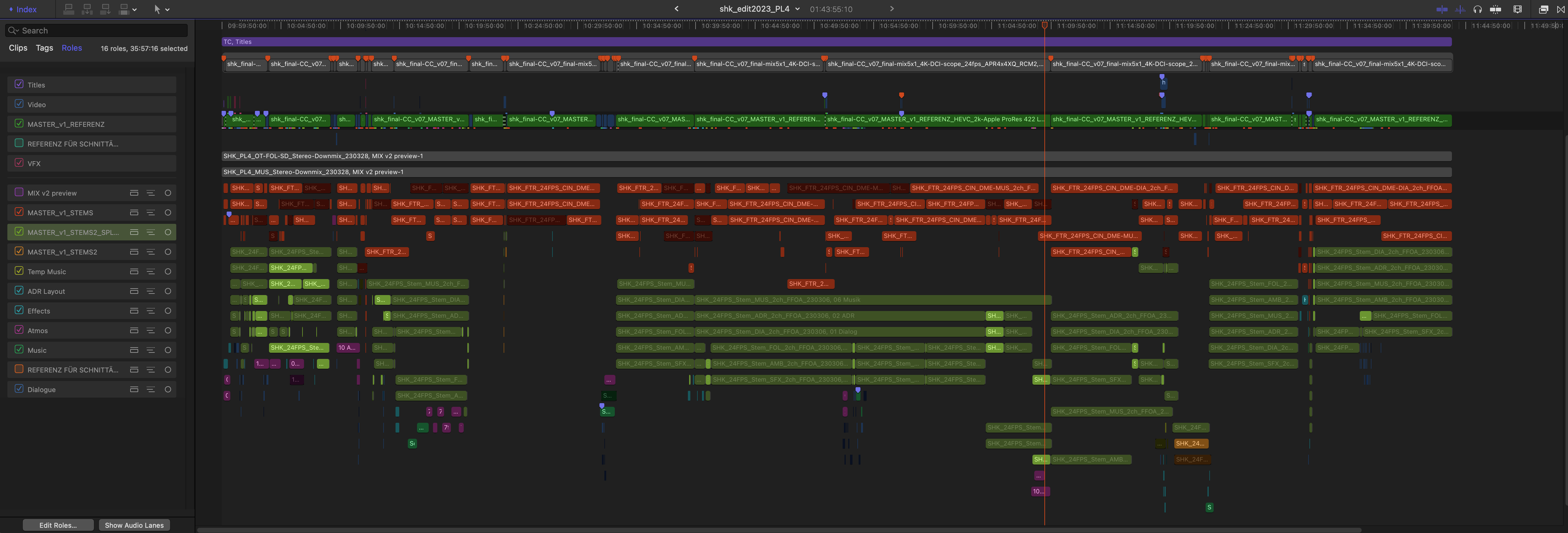
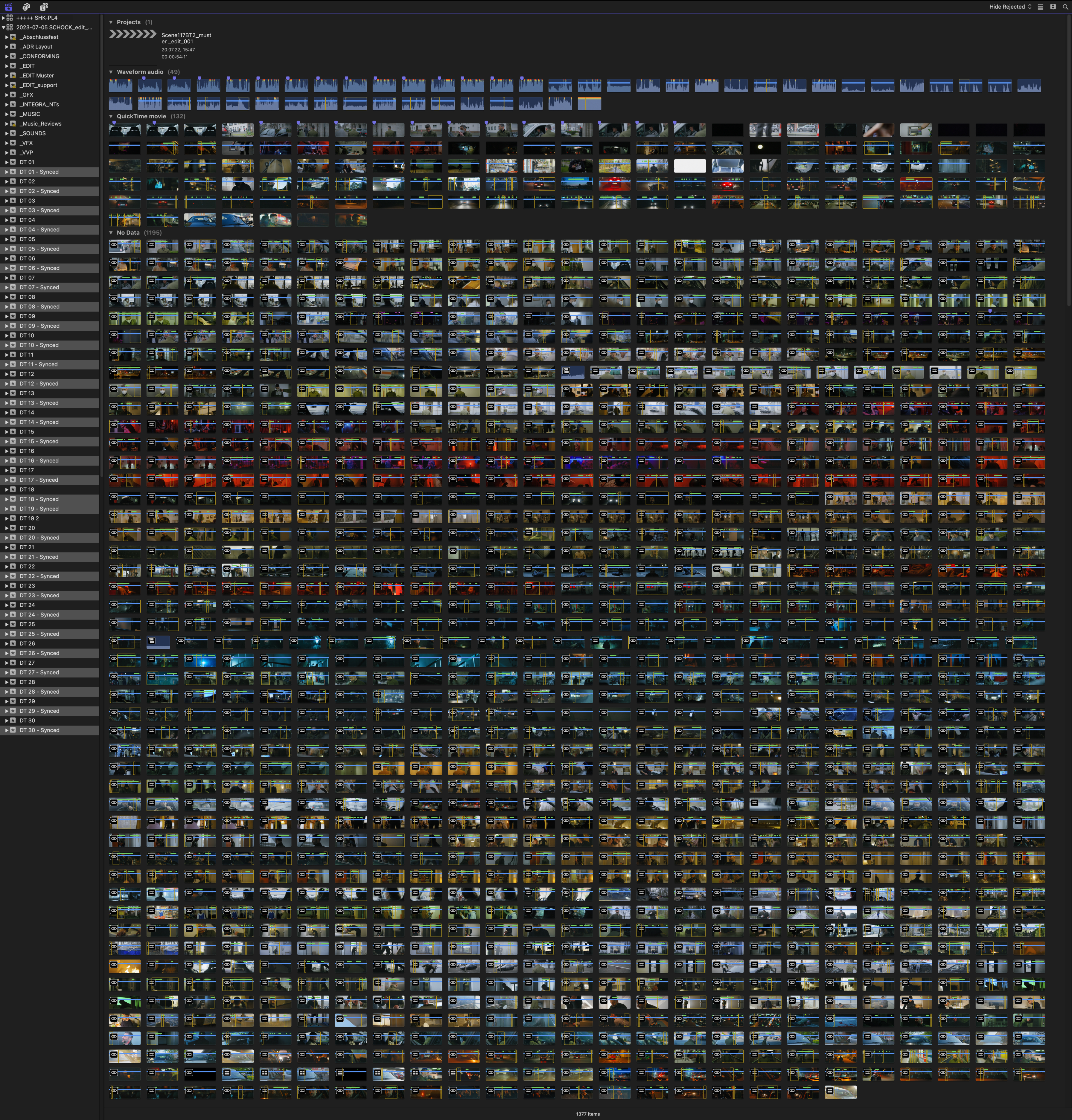
Florian Duffe made his debut as Film Editor with Luna (FCPX, 2015) and has since cut several Movies and Series for German national Television, most of them in Final Cut Pro. Most recently he was credited Additional Editor of the dystopian Sci-Fi-Thriller “Paradise” (Avid MC) on Netflix.
Follow Florian here:
